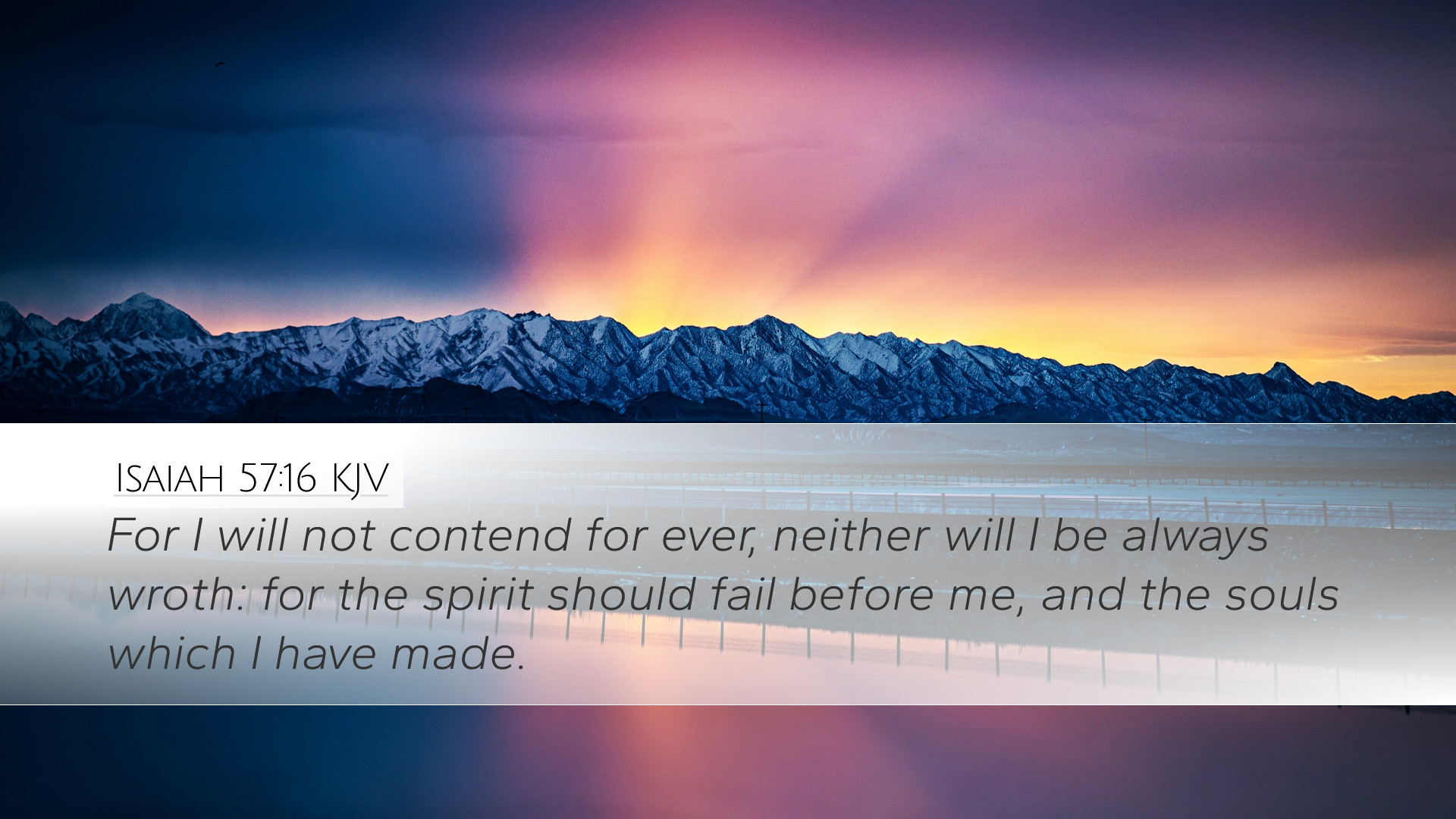Commentary on Isaiah 57:16
Introduction
Isaiah 57:16 states, "For I will not contend forever, nor will I always be angry; for the spirit would grow faint before me, and the souls that I have made." This verse reflects God's profound understanding of human frailty and the divine patience that governs His relationship with humanity. In this commentary, insights from various public domain commentaries, including those of Matthew Henry, Albert Barnes, and Adam Clarke, will be synthesized to provide a comprehensive understanding of God's character as revealed in this scripture.
The Nature of God’s Anger
Matthew Henry's Perspective:
Henry emphasizes that God's anger is not a permanent state but rather a reaction to human sinfulness. He notes that God's contention is aimed at driving people toward repentance, and His anger is a tool for correction rather than an end in itself.
Albert Barnes' Commentary:
Barnes mirrors this sentiment, highlighting that God's wrath is temporary. He argues that while God is angry due to the transgressions of His people, His ultimate desire is restoration rather than destruction. This demonstrates God's mercy and love as He chooses not to hold onto His anger indefinitely.
Adam Clarke’s Insight:
Clarke also captures the essence of God’s displeasure, indicating that while divine anger exists, it serves a corrective purpose. He elaborates on the notion that God’s longsuffering nature prevails; hence, He refrains from perpetual contending with humanity.
The Spiritual Weakness of Humanity
This verse acknowledges the frailty of the human spirit. The phrase, "the spirit would grow faint before me," conveys a vital truth about the limitations of human strength in the face of divine scrutiny.
Matthew Henry: He contends that human spirits cannot endure the weight of unending divine wrath. Continuous contention would lead to despair, highlighting the need for God’s mercy to preserve life and spirit.
Albert Barnes: Barnes further expands on this thought, suggesting that God understands the fragile nature of human existence. In essence, God's relenting demonstrates His compassionate understanding of our struggles and weaknesses.
Adam Clarke: Clarke acknowledges that while sin may provoke divine wrath, the compassion of God ensures that His people are not consumed by it. The acknowledgment of human frailty creates a foundation for hope and grace.
Divine Compassion and Restoration
God’s ultimate aim is not to destroy but to restore. This is evident in how He interacts with humanity, aiming to draw them back rather than push them away.
Matthew Henry: He paints a picture of God as a father who desires reconciliation with His wayward children. Henry suggests that despite our unfaithfulness, God’s mercy and lovingkindness drive His desire to restore broken relationships.
Albert Barnes: He elaborates on the idea of restoration by noting that God’s willingness to forgive and heal is an integral part of His nature. Barnes contextualizes it within the broader narrative of salvation history, where God always seeks to redeem His people.
Adam Clarke: Clarke emphasizes that God's compassion showcases His desire for a personal relationship with each individual. He suggests that God actively seeks those who are weary and burdened, inviting them to find rest in Him.
Conclusion: The Hope of Redemption
Isaiah 57:16 serves as a powerful reminder of God’s balance between righteous anger and profound mercy. As pastors, theologians, and scholars reflect on this verse, they are challenged to consider the depth of God's character: His commitment to justice veiled in mercy and His relentless pursuit of relationship with humanity.
This reflection on human frailty and divine compassion can inspire deeper theological discourse on the nature of sin, divine pedagogy, and the hopeful promise of redemption. The character of God, as echoed in the thoughts of Henry, Barnes, and Clarke, continually calls His people towards repentance, restoration, and relationship, underscoring the beautiful tapestry woven throughout Scripture.


